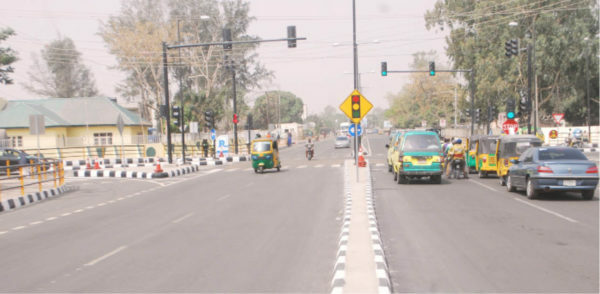With an impressive N44.9billion as Internally Generated Revenue (IGR) collected by the Kaduna State Government in 2019, the state pushed up a notch, overtaking every other state in northern Nigeria, except the Federal Capital Territory (FCT), as the highest IGR revenue collector. According to the Nigeria Bureau of Statistics (NBS), Kaduna State climbed to the sixth position, only trailing behind Lagos, Rivers, FCT, Ogun and Delta states.
Sokoto road constructed in 2020 is one of the most attractive road projects in the heart of Kaduna. With an impressive N44.9billion as Internally Generated Revenue (IGR) collected by the Kaduna State Government in 2019, the state pushed up a notch, overtaking every other state in northern Nigeria, except the Federal Capital Territory (FCT), as the highest IGR revenue collector. According to the Nigeria Bureau of Statistics (NBS), Kaduna State climbed to the sixth position, only trailing behind Lagos, Rivers, FCT, Ogun and Delta states.
However, the blueprint of what became Kaduna’s finest hour in revenue collection was laid down in 2015 when Governor Nasir el-Rufai came into office. Since the governor’s reform of the state’s internal revenue system, the executive chairman of the Kaduna State Internal Revenue Service (KADRIS), Dr. Zaid Abubakar, said the increased revenue collection had been witnessed every year.
Between 2011 and 2015, the state’s IGR had hovered between N9.7b and 12.78b, making the N44.9 billion generated in 2019 the highest since the creation of the state over 50 years ago. In 2015, Kaduna had generated N11.7 b, but soon after he came on board, Governor Nasir el-Rufai had, in 2016 appointed Ifueko Omoigui-Okauru, a former executive chairman of the Federal Inland Revenue Service (FIRS) to restructure the KADIRS for efficiency. By 2016, the state had generated N23b, which grew to N26.5b in 2017 and N29b in 2018.
The astronomical jump to N44b in 2019, which surpassed a target of N43b the KADIRS set for itself, had placed Kaduna on a trajectory of growth. According to Muhammed Muttaka Usman, a professor of Economics at the Ahmadu Bello University (ABU), the growth of revenue in economic terms means there is an increase in economic activities.
He, however, said that normally, tax is related to the buoyancy of a state when compared to the level of poverty index. Dr. Abubakar, who took the saddle at the KADIRS in 2019, explained that to get to where it is today, the Service ensured that all its 28 tax revenue lines remained active and that all agencies contributed efficiently to the IGR. “We had to collaborate with all the agencies to ensure that everyone was on board. So, if you look at the IGR in total, it is a combination of tax and non-tax revenues. That was what gave us the 44.9billion.
Having achieved this feat, the KADIRS set a new target of N50b for 2020, but it said that was before COVID-19, which forced many residents to stay at home and business activities suspended. “The next phase of activation, which we started this year, is to ensure that our stamp duty collection from executive instruments is brought back to life. It is something we are doing gradually.
Our estimation, prior to COVID-19, was to collect close to N50b by the end of 2020, but now, we have to review the factors and the impact of COVID-19 to see what would happen in the rest of the year,” the executive chairman said. However, Professor Usman said while it is impressive that Kaduna State generated such a huge amount, especially looking at the trajectory of growth from 2015, it must be seen to reflect in the living standard of the people in the streets.
“The question to ask is: Yes, there is an increase, but is there any increasing economic activity in the state? Is there an increase in the number of factories? Some people could also say that Kaduna is one of the highly taxed states in the country,” he said. He said that having blockages in the civil service, and the fact that revenues from ministries, departments and agencies are collected from source could give the state an edge, but cautioned that where IGR is on the rise due to mainly PAYE and where there are no increased economic activities, the state must be conscious of the possibility of pushing residents into poverty lines.
Source: dailytrustng




